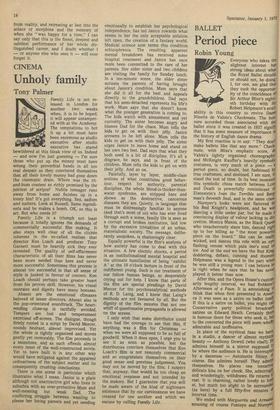CINEMA
Unholy family
Tony Palmer
Family Life is not released in London for another two weeks when, it is to be hoped, it will appear untampered with at the Academy. The temptations to hot it up a bit must have been enormous as studio executive after studio executive has stared bewildered at this bleak view of us. Indeed — and now I'm just guessing — I'm sure those who put up the money must have wrung their proverbial hands in all too real despair as they convinced themselves that all their lovely money had gone down the cinematic drain. Where was the titand-bum content so richly promised by the juiciest of scripts? Nubile teenager runs away from home and finishes up in a loony bin? It's got everything. Sex, sadism and nutters. Look at Russell. Same ingredients and he makes a bomb. OK, so this is art. But who needs it?
Family Life is a triumph not least because it totally ignores the demands of commercially successful film making. It also stays well clear of all the clichés inherent in the so-called realism that director Ken Loach and producer Tony Garnett must be heartily sick they ever invented. The quality of self-effacement characteristic of all their films has never been more needed than here and never more successful. Sometimes this process is almost too successful in that all sense of style is junked in favour of content. Ken Loach should perhaps take greater heart from his proven skill. However, his visual restraint and dignity have many bonuses.
Absent are the emotional climaxes beloved of lesser directors. Absent also is the pop-orientated soundtrack. The heartrending close-up is tactfully avoided. Tempers are lost and temperament exorcised off-screen. The dialogue, though firmly rooted in a script by David Mercer, sounds hesitant, almost improvised. Yet the whole is tightly organised and moves gently yet inexorably. The film proceeds in a monotone, and as such offends almost every tenet of the well-constructed movie. Yet to have built it in any other way would have mitigated against the apparent ordinariness of the subject matter and its consequently crushing conclusions.
There is one scene in particular which illustrates what I mean. Janice is a plain although not unattractive girl who lives in suburbia with an over-protective Mum and well-meaning but weak Dad. The conflicting struggle between wanting to please her loving parents and yet needing emotionally to establish her psychological independence, has led Janice towards what seems to her the only acceptable solution left open, the creation of a fantasy world. Medical science now terms this condition schizophrenia. The resulting apparent mental breakdown has received some hospital treatment and Janice has once more been committed to the care of her parents. Her elder sister and two children are visiting the family for Sunday lunch.
In a ten-minute scene, the elder sister accuses the parents of having brought about Janice's condition. Mum says that she did it all for the best and appeals directly to the grandchildren. Dad says that his semi-detached represents his life's work. Mum says that she doesn't know what the younger generation is coming to. The kids watch with amazement and yet curiosity. The sister becomes angry and blames Dad for the chaos. Mum tells the kids to get on with their jelly. Janice screams to be left alone. Mum tells the kids to get on with their jelly. The sister urges Janice to leave home and stand on her own two feet. Dad says that what they both need is a bit of discipline. It's all a disgrace, he says, and in front of the children. Mum tells the kids to get on with their jelly. And so on.
Painfully, layer by layer, middle-class notions of what constitutes good behaviour, respect for authority, parental discipline, the whole blood-is-thicker-thanwater syndrome, are stripped bare and shown as the destructive, cancerous diseases they are. Quietly, in language that must be distressingly familiar to anyone (and that's most of us) who has ever lived through such a scene, family life is seen as a corrupt and broken institution, laid low by the excessive trivialities of an urban, materialistic society. The message, deliberately unspoken, is shatteringly clear.
Equally powerful is the film's analysis of how society has come to deal with this situation. A few electric shocks, a period in an institutionalised mental hospital and the ultimate humiliation of being 'exhibit A' at the 10 o'clock lecture in front of the indifferent young. Such is our treatment of our fellow human beings, so desperately crying out for help. I know that parts of the film are special pleadings by David Mercer for the psychoanalytical methods of R. D. Laing, and I know that Laing's methods are not favoured by all. But the dignity of the film ensures that not one whiff of questionable propaganda is allowed on the screen.
I only wish that some distributor could have had the courage to see that this, if anything, was a film for Christmas — when we were all supposed to be so full of goodwill. When it does open, I urge you to see it as soon as possible, lest the distributors convince themselves that Ken Loach's film is not remotely commercial and so congratulate themselves on their good sense and previous judgement. You may not be moved by the film; I suspect that, anyway, that would be too cheap an emotional response and not intended by the makers. But I guarantee that you will be made aware of the kind of nightmare existence that by our carelessness we have created for one another and which we excuse by calling Family Life.














































 Previous page
Previous page